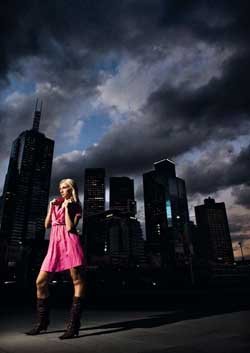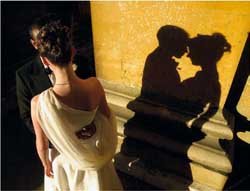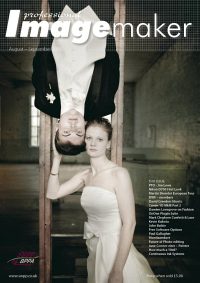articles/Portraiture/bigflash-page1
Big Flash Portraits... - part 1 of 1 2
by Damien Lovegrove Published 01/08/2008

Big Flash Portraits...
Fashion portraits take social photography to the next level.
"Can social photographers come close the results of the fashion Fashion portraits take social photography to the next level. greats without the big budget...? "
The world of portraiture has always been influenced by the fashion industry with big budgets to lavish on the images that make the brands. Image is everything and it usually takes a team to make them. A fashion editor, stylist, hair artist, make up artist, art director and of course the photographer with his or her assistants. This circus is very powerful and focussed. The question that has been on my mind for some time is 'Can social photographers come close the results of the fashion greats without the big budget, and can they produce these images in sufficient quantity to make a living?' The answer is definitely yes. For my editorial work I often shoot a dozen finished frames from which a magazine editor will select six or so. My portrait clients want twenty plus images from each shoot to work together in an album. With this in mind I have had to speed up my shoot rate and select my lighting kit wisely.
started my journey towards the unnatural beauty of flashdominated imagery three years ago when my clients started to take traditional 'lifestyle' images on their sub £500 SLRs. I had to raise my game way beyond the look achievable by my clients at home. I started with a wonderful 400ws portable flash system from Quantum. Amazingly the Quantum Qpax system worked in TTL mode with my Hasselblad H1 and Phase One P25 back. It's the only big flash unit to do so and made shooting wedding groups really easy. The Quantum kit opened my eyes to the opportunities I had to refresh my portrait look. Three years on, and now I use Canon cameras, with flash at the heart of my everyday portrait toolbox. The evolution of my photographic style has been so important in this age where standing still has become commercial suicide. Clients demand that professional difference, and getting to grips with 'big flash' has empowered me to meet their demand

My current portrait big flash system of choice is a Broncolour Mobil kit, at 1200ws it gives me just enough power to work with the sun in the frame. It is light enough to carry in one hand with my camera bag over the other shoulder and the flash head is tiny when compared with the competition. This is a big advantage when you are working on your own. I've used the Mobil kit on beaches, boats, and in palaces. My other equipment includes a Canon 580EX11 Speedlight, a lighting stand made by Lowel, and brollies I bought online for £15 each. I've flirted with various radio trigger systems over the past three years but I have settled on Pocket Wizzards that are robust, light and reliable.
I use the Mobil flash head on a stand in one of these three set ups:
1. Bare faced, without any diffusers to give me a single point light source. This is ideal for creating crisp, hard shadows and gives the greatest light output.
2. With a brolly - a silver-lined brolly when working outside as it puts the vast majority of light in the right direction whilst giving me a broad (softer) light source. A translucent shoot-through, white nylon brolly when working inside. Half the light is reflected up and back into the room while the other half is transmitted towards my subject.
3. With a lightweight fresnel lens attachment to create a pool of light. This adjustable spot of light is perfect for the subtle jobs where you want to create a natural unlit look and it's great at making dramatic pictures too. It is my favourite way of using flash by far.
I use the Canon Speedlight off camera bare faced or with a Stofen diffuser. I trigger the flash with my trusty STE2 transmitter that gives me full TTL control. When I work inside I find there is enough infrared pulse reflecting off surfaces to trigger the Speedlight reliably, whatever direction it is pointing in. When outside, the STE2 struggles to trigger the Speedlight if it is not in direct line-of-sight. In these circumstances a Radio Popper comes in handy. Breaking away from TTL metering was easy for me because I'm used to working a flash system and my camera manually in the studio, but some of my delegates struggle a little to create the fine flash/ ambient balance adjustments required. I spend extra time on my workshops getting these factors right and empowering my delegates to take full manual control when using big flash kit.
I have tried ring flash and have developed a love-hate relationship with it. It may just become a major part of my future kit but for now I'm sticking with conventional flash. I have my eye on the amazingly good value, lightweight system from Flaghead that adapts a standard Speedlight into a ringflash, but at the time of writing it is not made for the 580 EX11 flashgun. I'll just have to be patient.
Creating looks...
Using exposure balance...Setting the camera to give a two stop under exposed background with a wallop of flash really starts to make the shot look stylised. By contrast, working the background at just one stop down with a splash of flash from a silver brolly can look like fading sunlight on an otherwise overcast day. Very subtle use of flash from a large source like a soft box will just lift the contrast in your clients face enough to create a healthy glow and radiance.
Using light modifiers...Controlling the direction and relative size of the light source can greatly affect the power of flash required. When I'm competing with the sun and want to use a brolly to soften the light I will switch the Mobil pack to full power. The top fashion photographers often use packs many times the power of my kit. This enables them to use soft boxes and other diffusers at greater distances. The good news is you can get 95% of their look with just 1200ws of light.
You are currently on page 1 Contact Damien Lovegrove
1st Published 01/08/2008
last update 09/12/2022 14:51:45
More Portraiture Articles
There are 0 days to get ready for The Society of Photographers Convention and Trade Show at The Novotel London West, Hammersmith ...
which starts on Wednesday 14th January 2026





